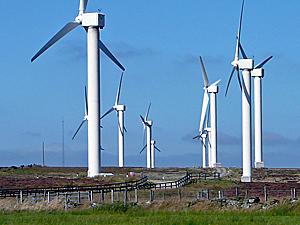Canada ranks among top 10 locations for renewable energy investment
 Canada is the ninth
Canada is the ninthmost attractive location in which to invest in renewable energy
projects, according to Ernst & Young’s latest Renewable energy
country attractiveness indices.
Canada retained ninth position out of 27 countries analyzed for
their attractiveness for renewable energy infrastructure investment
- increasing the score gap over Portugal and Ireland, both ranked
tenth - driven by the stability and resilience of the Canadian
financial system during the ongoing capital market challenges
around the globe.
“Canada is holding firm while some others have slipped in an
uncertain economic and regulatory environment,” said Stephen Lewis,
leader of Ernst & Young’s Renewable Energy Advisory practice in
Canada. “We’re seeing some significant activity that is increasing
the share of renewables in Canada’s energy mix, but if we want to
be seen as a market leader, more work will be required from all
stakeholders in the industry.”
At a global level, Ernst & Young’s Renewable energy country
attractiveness indices report that China invested a total of
US$34.6 billion into its clean energy projects last year - almost
double that of the US - and has now emerged as the world’s market
leader in installed wind power capacity in 2009.
The top 10 all renewables index as of May 2010 includes the
following countries:
1) United States
69
1)
China
69
3)
Germany
64
4)
India 63
5)
Italy 61
6)
UK
61
7)
France
58
8)
Spain
57
9)
Canada
53
10) Portugal and Ireland 51
According to the ranking, Canada is now only four index points
behind eighth-placed Spain. The reduction of the score gap with
Spain is driven by capital market concerns and proposed reductions
to its solar incentives program, whereas Canada has made proactive
improvements within its domestic market.
As the federal government chose not to
renew the ecoENERGY tax credit, the industry is hopeful that new
policies will be enacted to support domestic renewable energy
generation and innovation.
In Canada, a number of provinces are pursuing a “shift to
green.” Ontario and British Columbia are prime examples: with
recent policy in Ontario stimulating considerable activity across
the renewable energy value chain, and British Columbia proposing a
new Clean Energy Act, while BC Hydro has announced new power
purchase agreements and further calls for projects.
- In order to further enhance Canada’s attractiveness to
renewable energy investment, a number of actions can be taken,
depending on stakeholder objectives, including the
following: - A drive within the public sector to become buyers of renewable
energy and energy efficiency technology, which would help
stimulate the market and support private sector
innovation - Government (provincial or federal) support for
domestic manufacturing, through warranty backing or other
guarantees - Support for renewable energy through generation-based
incentives within individual provinces, which would better
facilitate energy infrastructure
Ernst & Young’s quarterly country attractiveness indices
score countries’ renewable energy markets, renewable energy
infrastructures and individual technology sustainability out of
100.
About Ernst & Young
Ernst & Young is a global leader in assurance, tax,
transaction and advisory services. Worldwide, our 144,000 people
are united by our shared values and an unwavering commitment to
quality. We make a difference by helping our people, our clients
and our wider communities achieve their potential.
You can return to the main Market News page, or press the Back button on your browser.

